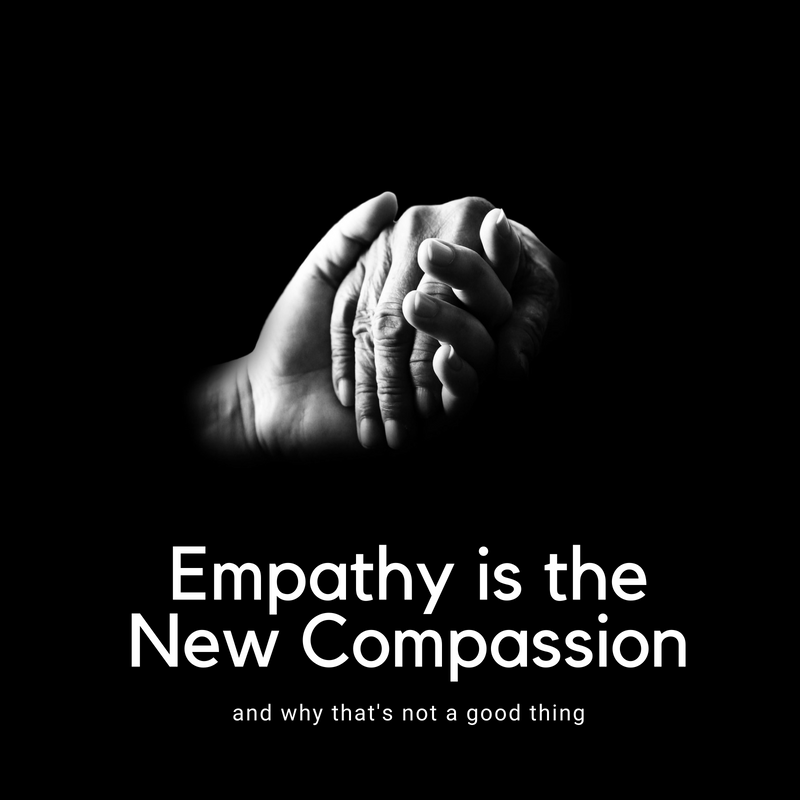Everywhere I go I hear about the need for empathy in our society. Empathy has this sort of wide appeal to almost everyone. It is used in popular social psychology. It has been wielded by politicians, religious clergy, fundraisers and salespeople.
But where did this word come from and why did it become so widespread?
The word comes from Greek roots, literally meaning “in feeling.” It was coined by a German philosopher in 1858, more widely translated in 1909. It was first applied to the way a person views artwork. It was applied to anyone with the ability to project his or her personality into the artwork. Thus, “feeling in” the piece.
Today, the concept of empathy has morphed. We have heard the contrast between sympathy and empathy. Sympathy is said to feel FOR someone. Empathy is to feel WITH someone. Obviously, the latter is preferred as a mode of connection with a person. No one wants to be pitied or felt FOR. They want to be felt WITH.
And so, our infatuation with the word “empathy” has grown over the last hundred years.
Empathy is very engaging. That is why we watch movies. We want to enter into a character’s world, to feel what it is like to be them, to experience the things they experience and to have to make the choices they face.
When people raise money for charities, the smart ones don’t only rely on big picture facts and figures. They will inevitably pull out a single story, one that showcases the plight of a single individual. The communicator knows that if he or she can get you to enter into someone’s story— to engage and project your own experiences on to the story, you will be much more likely to engage your emotions and, in turn, your pocketbook.
Politicians play to empathy when they talk about their own life experiences and those of the people groups that they want to fight for.
Empathy is part of the human experience. It is a very important part. People who have no capacity for empathy are not healthy individuals. We feel with people. Even little babies will cry when they hear another baby crying. Empathy stretches our intellect. The ability to see outside of our own skin and put ourselves in someone else’s shoes is very helpful. Children who are avid readers can experience greater empathy than those who read less. It can lead to greater levels of compassion and altruism.
However, new research has come to the surface to suggest that empathy has a downside too. A recent paper published in the Personalty and Social Psychology Bulletin states that people who felt empathy toward another person were more likely to engage in aggressive behavior when they thought that the person they felt empathy towards was threatened.
Prabarna Ganguly writes,
“Participants were, to a surprising degree, willing to inflict pain on a certain person to help a distressed individual they felt empathy for. What’s more, it can be activated even “in the absence of wrongdoing or provocation from the target of aggression.” That party doesn’t have to be doing anything wrong; he or she simply has to pose a problem for the person you empathize with.”
Did you read that correctly? It says, “That party doesn’t have to be doing anything wrong; he or she simply has to pose a problem for the person you empathize with.”
So it seems that empathy can cause scary ethical problems for us in its real life application.
Well, as a Christian, I would like to use the Bible, particularly the example of Jesus, as my standard for character, virtue, and morality. We just learned that the word empathy was not circulated until 1908, so it would stand to reason that the word is not used in the Greek text of the New Testament. However, a comparable word is used— compassion. The word compassion is an emotional word in the Greek. It means to have an altruistic feeling in your gut toward someone.
Moved by compassion, Jesus was about to go about his business, but compassion moved him to stay a little longer teaching the crowds. Compassion moved him to heal their sick. Some translations will say, “he had pity on them” because they were like sheep without a shepherd… But we don’t like that word, pity! It makes us feel too… well, pitiful.
Compassion differs slightly from empathy in that the person having the emotion remains distinct from the object of the emotion. When Jesus had compassion on the crowds, he felt their emotions, but he wasn’t consumed by them. He remained himself, a distinct person who was presumably, not one of the sheep, but in that moment, the shepherd. Of course, he would go to the cross as a lamb, fully identifying with us in his death, burial and resurrection. He felt all the feelings of humankind, and yet he did not succumb to our moral weaknesses.
Part of the problem with empathy is that it can only be directed specifically. While logic can be applied to all people under all circumstances, empathy can only feel for one person (or people group) at a time. After all, looking at the original use of the word, it’s pretty hard to engage in multiple pieces of art all at one time. Compassion, then, is that unique ability to feel for multiple individuals or groups of people at the same time. Jesus was able to see the big picture. He saw his overarching mission and he was headed in the direction of his mission. However, when his compassion moved him, he stopped what he was doing and he met that need. He didn’t instantly take on every problem that the particular group faced. He didn’t lose sight of his mission for the whole of humanity just to “feel with” that one group. I’m sure there were many who wanted him to stay and fight every battle for them, but he didn’t. Because his compassion allowed him to see both emotional suffering and big picture logic simultaneously. To understand the plight of the poor, while allowing the woman to “waste” her expensive alabaster box of perfume preparing his body for burial, to risk offending a woman by calling her a dog but then healing her daughter anyway, to having compassion on his mother at the cross while forgiving his murderers saying, “They know not what they do.” If Jesus’ goal was empathy (rather than compassion) he might have gotten swept away in the problems of others and not been able to offer them a way out of the messes they were in.
It is conceivable that a person full of empathy for unborn babies could place a bomb in an abortion clinic. They so over-identify with the poor little babies that they lose their powers of reasoning and big picture principle that all life is valuable. It is conceivable that the statistics of illegal immigration could get lost on someone who has their empathy directed toward only “undocumented immigrants” or only toward “legal Americans.” Empathy is insufficient in that it can cause a person to lose their big-picture critical thinking skills that are needed to solve big societal problems. Suddenly, the person who serves the poor begins resenting the middle class or upper class for just “not getting it.” The businessman who begins identifying only with other wealthy businessmen no longer has any patience for someone who cannot “pull himself up from his bootstraps” and make something of himself. Immature forms of empathy can have a tendency to pull us to the lowest common denominator. We allow our own experiences to get jumbled up in the experiences of others and it clouds our logical thinking. I believe that compassion is the mature and full expression of the more underdeveloped emotions of empathy.
Logic and emotion do not have to be enemies. We just have to know where to place them and the reasons they exist. In the meantime, I would encourage you to pursue, not empathy as your ultimate goal, but compassion— the ability to feel for another deeply, and and to yet remain distinct from. Can you help me bring compassion back in style?
Please share and engage in our conversation. I plan on discussing this topic more in my soon to be released podcast. Also, you can join a real face to face conversation on this and other interesting topics at Brave Conversations on Facebook!

